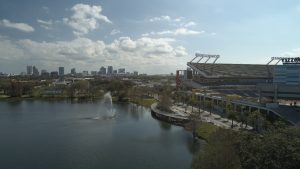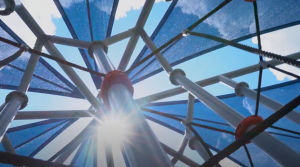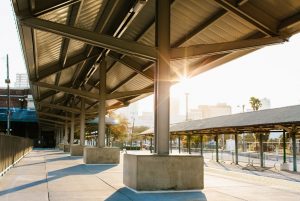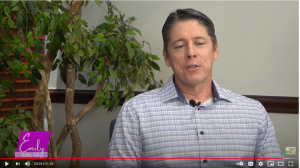The Americans with Disabilities Act was signed into law on July 26, 1990, by President George H.W. Bush. The ADA is one of America’s most comprehensive pieces of civil rights legislation that prohibits discrimination and guarantees that people with disabilities have the same opportunities as everyone else to participate in the mainstream of American life — to enjoy employment opportunities, to purchase goods and services, and to participate in State and local government programs and services. Modeled after the Civil Rights Act of 1964, which prohibits discrimination on the basis of race, color, religion, sex, or national origin – and Section 504 of the Rehabilitation Act of 1973 — the ADA is an “equal opportunity” law for people with disabilities.
In recognition of the 31st anniversary of the ADA, Orange County Commissioner Emily Bonilla interviewed local community and business leaders about the importance of all aspects of the ADA as part of an episode of her talk show, Emily Tells All. In this segment, she interviews Rob Maphis, President of The Collage Companies about the integral role that ADA compliance plays in the construction industry in general and learns more about Collage’s recent ADA playground at Orlando’s reinvigorated Lake Lorna Doone Park.
The following is a portion of the transcript from the interview:
Emily: Tell us about Lake Lorna Doone Park, and who came up with the idea, who contracted you.
Rob: Lake Lorna Doone Park has been certainly an important part of Orlando for many years. A long time has a historic significance, things that have happened there through the years, have been very important to the City of Orlando, and certainly the West Lakes community. And the idea of improving the park and really putting into the next phase of its existence has been bounced around for quite some time.

Rob: Florida Citrus Sports, who is obviously, the tenant in the adjacent Camping World stadium and really, Steve Hogan, and a number of other community leaders, have talked about the need to improve that park for quite some time. Obviously, with a partner like the City of Orlando. The wheels started turning, number of years ago, to come up with a plan of what that would mean and the way the park would look, and the amenities that would be part of the park. So, we, as the construction manager, the builder for the park were engaged a number of years ago, we worked alongside the design team, GAI, and they really provided much of the concepts for what would be implemented and what would become what it is today. So, those elements of the park, whether it be the Play 60 field that Florida Citrus Sports was heavily involved in, to the splash pad, to the Arnold Palmer golf course that is there to match portion of Bay Hill. All those elements came up from the collective thinking of the city of Orlando predominantly and of course, Florida Citrus Sports.

Rob: Lake Lorna Doone is a perfect example of an owner, again, Florida Citrus Sports, City of Orlando, working to make sure that they not only comply with the ADA, with the Americans with Disabilities Act but also go above and beyond. Making sure that not just that we have ramps that are in compliance and handrails that are in compliance and as you mentioned ramps, that would allow for those who are in a wheelchair to access the playground. It goes beyond that. Allowing for, if somebody was in a wheelchair, to not impede them from being able to roll up to the chess tables that are out there. So, there’s so much that goes into making sure that the facility complies, first of all, of course. But also goes above and beyond to make sure that those that are challenged, visually impaired, any of the elements that might keep them from being able to enjoy the park. We try to break down those barriers. And that’s exactly what this design team again, G AI and the owners, City of Orlando and Florida Citrus Sports did.
Rob discusses Collage’s construction expertise in the transportation industry.
Rob: One of the things that we do, we’re big transportation builders, do a lot of transportation work. Obviously, transportation, getting people from point A to point B, and including those that are accessibility challenged. We do that quite a bit. One of our clients is Amtrak. So, we are one of eight contractors in the country who perform ADA upgrades for Amtrak stations nationally. We have projects that we’ve done in Tampa, and Mississippi, and North Dakota. So, we are all over performing ADA.
Disney Universal, they really cater to those with disabilities. Amtrak had challenges. If you go to particularly some of the older stations that are over a hundred years old. Like the Tampa Union Station that we upgraded. In order for somebody with a disability to access the railcar, they would have to have a lift. So, they would physically move a lift that would allow them to be raised up to the train. That is a hindrance to the traveler. Obviously, it’s a burden for those who are with them. So, what Amtrak has done, is they went to each of these individual stations. It’s still ongoing program and they developed whether they were going to enhance those lifts, or they were going to put platforms.

The project that we (The Collage Companies) did in Tampa – Tampa Union Station. It’s a historic station, that was one of the stations that had a platform that was on the ground level, and you would have to somehow be lifted up to the rail cars. What we did there is we put in a platform; it was a 10-million-dollar project to enhance this platform. So that if somebody goes there today, they can roll quite literally, roll right up into the train.
Rob Maphis, President of the Collage Companies on the significance of ADA compliance within the construction industry, “ADA is not just for those who are permanently disabled, but those who may have a temporary situation that ultimately they’ll recover from and not have that disability more. It’s to acknowledge the needs of everyone so that there aren’t those obstacles and living your life to the fullest.”
